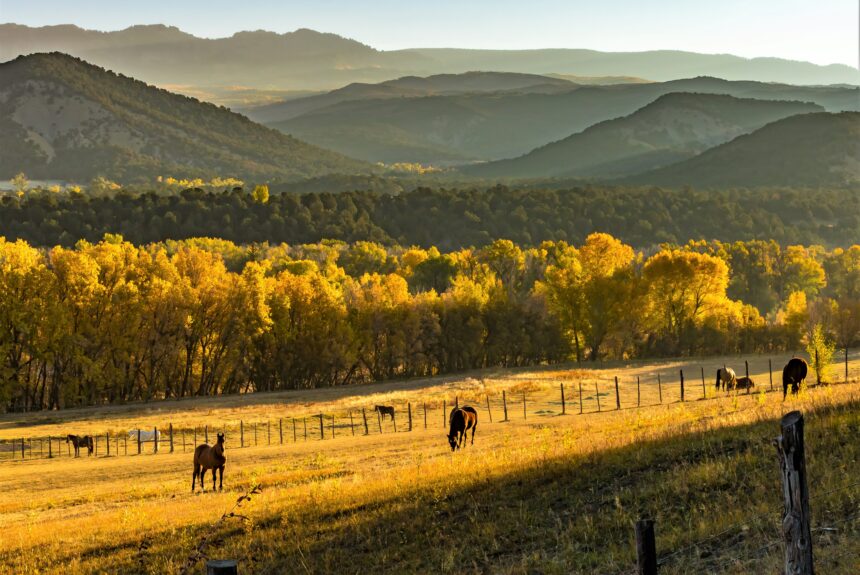Agriculture plays a pivotal role in America’s economic and societal well-being. In 2020 agriculture contributed $134 billion to the U.S economy, representing 0.6% of gross domestic product (GDP). In the same year, agriculture represented 11% of America’s total emissions, according to the Environmental Protection Agency (EPA). As the global focus to address climate change increases, American farmers will have a significant role to play in reducing greenhouse gas emissions. Regenerative agriculture can help accomplish these goals.
>>>READ: American Prairie Shows How the Free Market is Conserving our Natural Environment
America’s farmers, who are often dubbed our “first environmentalists,” have made incredible progress in reducing the environmental footprint of their activities. From 1948 to 2015, America’s agriculture sector tripled its total output while using 24% less land and 75% less labor.
Regenerative agriculture, which includes practices such as cover crops, no-till farming, and crop rotation, can help farmers continue to capitalize on their incredible climate progress. According to a recent study, microbes in the soil, which increase when practices like cover crops and no-till farming are implemented, may be “the main driver of differences in the potential to store [carbon] in soils.”
Analysis from the EPA shows that regions with higher amounts of cover crops, such as the Corn Belt, have higher concentrations of carbon dioxide sequestered in the soil. Not only do these practices increase soil’s carbon sequestration potential, but it also improves soil health and crop yields, an environmental and economic win-win for farmers.
While the benefits of regenerative agriculture are clear, implementation can be costly and hard to navigate. The Noble Research Institute, located in Ardmore, Oklahoma is helping farmers and ranchers take steps to include regenerative practices in their operations. John Hart recently interviewed Hugh Aloje, Director of Producer Relations at Noble, as a part of C3’s Tech Voices interview series.
According to Aljoe, Noble’s “sole purpose is to help farmers and ranchers and keep them on their land while improving the soil.” Through its team of researchers, consultants, educators, and ranch managers, Noble works with farmers and landowners to regenerate land economically. In total, Noble operates on 14,000 acres of working ranch lands to research and more thoroughly understand sustainable practices.
Aljoe, who prefers to focus on soil health and profitability rather than labeling a practice as “sustainable” or “not sustainable,” has seen first-hand how a mindset change can be helpful for farmers and ranchers who are changing their approach to land management.
“The mindset in itself is beginning to look at the four ecosystem processes. And those are, of course, the energy flow, the water cycle, the nutrient cycle, and commutative dynamics. Most people don’t really know the term communicative dynamics, but it requires looking at the entire ecosystem, looking at your plants and livestock, and how you as an individual interact to improve the other three ecosystem processes.”
After taking time to understand the history of the land, including looking at what it was like pre-civilization, the Noble team teaches landowners practices that emphasize the importance of soil cover to retain rainwater and prevent runoff, which in turn increases plant diversity.
>>>READ: How C16 Biosciences is Revolutionizing the $61 Billion Palm Oil Industry
Biodiversity improves soil health and is an oft-overlooked, yet highly important aspect of regenerative agriculture. A 2021 study from researchers at the University of Minnesota, found that biodiversity increased soil nitrogen, potassium, calcium, magnesium, cation exchange capacity, and carbon levels by 30-90%, versus plots of land that followed monoculture farming. The same study suggested that biodiversity increased plant productivity, which in turn boosted soil health and fertility.
And while regenerative practices have been met with resistance by some farmers in the past due to upfront costs, economic conditions that have increased the price of fertilizer are making the transition more affordable, according to Aljoe.
“If you look at what our extension system was focused on in the past, it was trying to give producers answers. Let’s make it simple, let’s make it easy. When input costs were inexpensive, it made sense and as a result, we’ve grown a population of producers that are more focused on the practices and the protocols of what they’ve done from year to year because it worked. If you wanted more production, you’d add more fertilizer. But fertilizer isn’t cheap anymore. The [traditional] management practices, the inputs that go along with it are more costly. How do you pull that out and better understand how to manage our cattle, our livestock, and our land such that we don’t have that dependence on a lot of those inputs that we’ve been able to afford over the last few decades? We just can’t afford to do that anymore.”
When asked about what lawmakers at the state and federal levels can do to help these farmers, Aljoe emphasized the need for policies that empower, rather than restrict innovation.
“Unfortunately policy oftentimes comes with protocols that are very restrictive. That’s a challenge. Yes, you want to encourage soil health management, you want to encourage sustainability, but when you start putting protocols where it restricts the management capabilities of the producer, and they’re really good these producers, they don’t need it. Oftentimes they don’t need the policies. They’re already ahead. They want to do the right thing. It’s helping people get over the hump.”
With the need to reduce climate risk becoming more prevalent, farmers, ranchers, and landowners must play a central role in any effective mitigation strategy. Thanks to groups like the Noble Research Institute, America’s farmers and ranchers are tapping innovation and natural solutions to make a lasting positive impact on the environment.
The views and opinions expressed are those of the author’s and do not necessarily reflect the official policy or position of C3.
